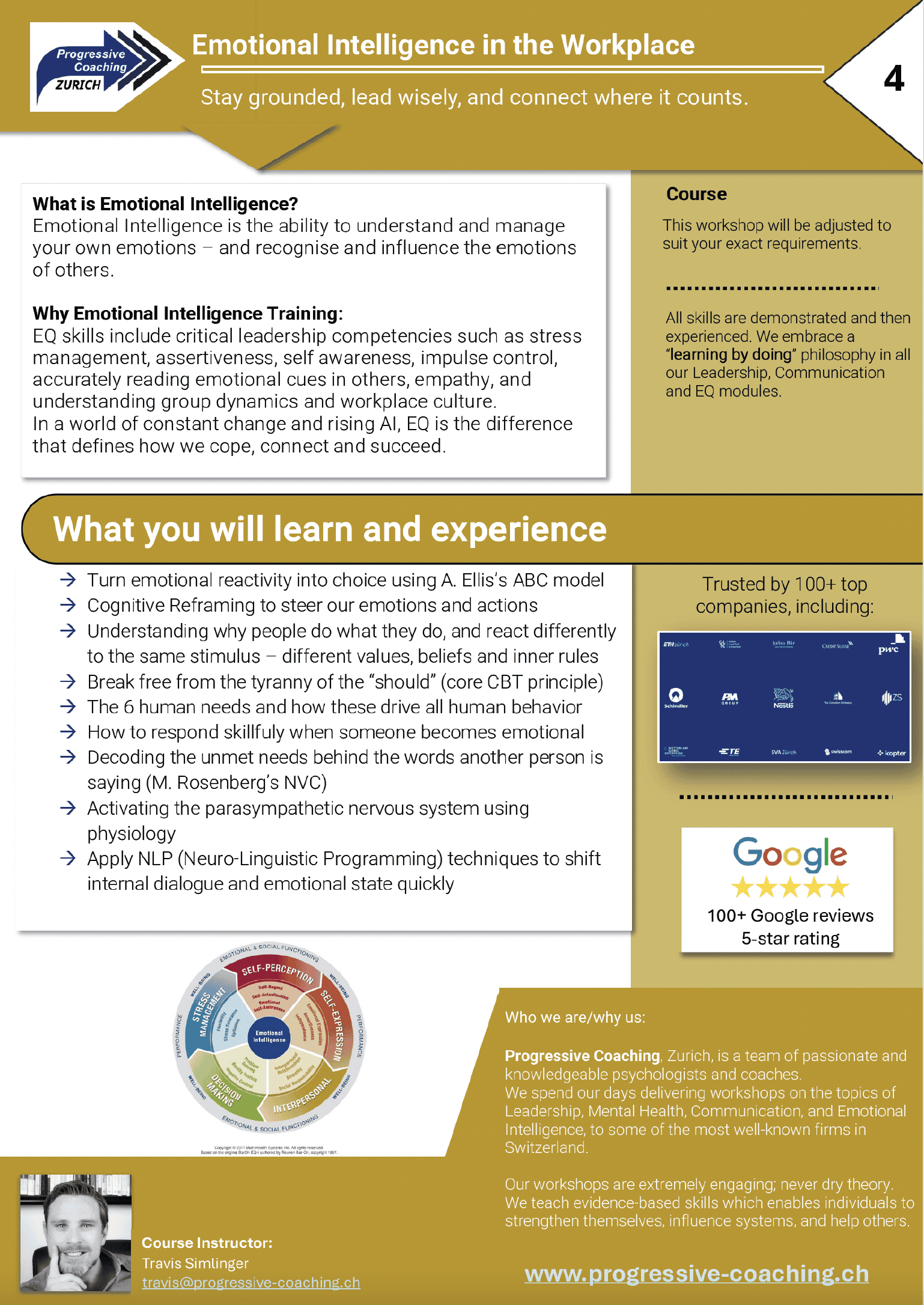Emotional Intelligence Workshop
Unlock EQ – The Essential Skill in Today's Workplaces
Emotional intelligence (EQ) is named by the World Economic Forum as one of the most vital skills in today’s AI-driven, hybrid-working world. It boosts adaptability, deepens communication, and improves collaboration –leading to sharper decisions, stronger teams, and better business outcomes.
What Our Emotional Intelligence (EQ) Workshops Deliver
Stronger Relationships and Communication
By training EQ skills – including active listening, perspective-taking, and managing emotional triggers – participants improve how they connect with others, reduce misunderstandings, and build trust across teams and hierarchies.
Increased Adaptability and Stress management
By training EQ skills – including self-awareness, emotional regulation, and empathy – participants develop the ability to stay calm under pressure, adjust more effectively to change, and respond rather than react in high-stress situations.
Better Decision-Making Under Pressure
By training EQ skills – including impulse control, clarity under stress, and recognizing emotional bias – participants learn to pause, assess situations more accurately, and make thoughtful, well-balanced decisions – even in fast-paced environments.
Emotional Intelligence Workshop
Emotional Intelligence (EQ) skills include critical competencies such as stress management, assertiveness, self-awareness, impulse control, accurately reading emotional cues in others, empathy and understanding group dynamics and workplace culture. All skills we teach are grounded in evidence-based psychology – including cognitive behavioural therapy (CBT), neuroscience, emotional regulation theory, and communication models such as Nonviolent Communication (NVC), Neuro-Linguistic Programming (NLP), and Rational Emotive Behaviour Therapy (REBT).
Workshop participants learn and practise:
- Understanding empathically why people do what they do – different values, beliefs, and inner rules (A. Beck's CBT)
- Decoding the unmet needs behind the words a person is saying (M. Rosenberg's NVC)
- Apply NLP (Neuro-Lingusitic Programming) techniques to shift internal dialogue and emotional state quickly
- Understanding body language – our effect and interpreting others (NLP)
- Turn emotional reactivity into choice using A. Ellis's ABC model (Ellis REBT)
It takes something more than intelligence to act intelligently.
Fyodor Dostoevsky
Workshop Topics
Self–Awareness and Leadership Presence
Self-awareness is a core emotional intelligence skill that directly impacts performance, communication, and leadership. In this workshop, employees and managers learn to identify personal triggers, stress responses, and behavioral blind spots. Backed by proven psychological frameworks, this training helps participants respond with clarity instead of reacting on autopilot. Increased self-awareness leads to better decision-making, improved collaboration, and stronger leadership presence across all levels of the business.
Emotional Agility
Emotional agility is the ability to stay flexible, focused, and constructive – even when facing stress, setbacks, or interpersonal tension. Rather than suppressing emotions or reacting impulsively, participants learn to navigate emotions intelligently and respond in alignment with their values and goals. This workshop combines practical tools from emotion regulation theory, CBT, and mindfulness to help employees deal with change, pressure, and conflict without losing balance. Emotional agility boosts team dynamics, decision-making, and overall psychological safety at work.
Empathy in Communication
Empathy is not just about being “nice” – it’s a critical business skill for building trust, reducing friction, and strengthening collaboration. In this workshop, we train employees to recognize emotional cues, understand others’ perspectives, and communicate with clarity and respect, even during difficult conversations. Using structured tools drawn from NVC, NLP, and group dynamics, participants learn how to balance empathy with assertiveness. These skills help improve workplace culture, foster inclusive leadership, and support healthier interpersonal relationships across all levels of the organization.
What our workshop participants say




Schedule Your Free Expert-Consultation
Looking for more details on how our services can benefit your organization? Book a personalized online consultation with one of our experts today.

3 Seamless Steps
1. Book a Consultation
Schedule a consultation with our experts to discuss your needs and customize your training.
2. Receive Details
We’ll provide a detailed agenda, offer, and brochure to promote the workshop internally.
3. Flexible Delivery
Training is delivered at your preferred time and place, either face-to-face or online, with all materials included.
Frequently Asked Questions
Emotional Intelligence (EQ) is the ability to recognize, understand, and manage your own emotions – and to recognize, understand, and influence the emotions of others. It includes essential skills like self-awareness, emotional regulation, empathy, and effective communication.
In today’s fast-changing, high-pressure work environment – where remote teams, cultural diversity, constant change, and AI are the norm – EQ is no longer a “nice-to-have.” It’s a critical skillset for navigating complexity, leading with impact, and building resilient, high-performing teams.
Unlike IQ, which remains relatively fixed, EQ can be developed through structured training – making it one of the most powerful tools for personal growth and business success in the modern workplace.
Although we overlap and combine some skills in each workshop, following are the general differences: Communication training focuses more on communication techniques, what to say, how to say it, how to listen, what not to say, etc. EQ training builds the inner capacity that makes those techniques work under pressure.
In today’s workplace, it’s not just about saying the right thing – it’s about staying composed when tensions rise, reading the emotional tone of a meeting, and responding with empathy when others shut down or push back. That’s where emotional intelligence comes in.
EQ training strengthens the emotional self-management and social awareness that enable communication skills to stick – especially during conflict, stress, or change. It helps people not only express themselves better but also understand themselves and others more deeply, which is essential for collaboration, leadership, and trust.
Absolutely. All of our workshops can be tailored to your company’s needs. We can combine topics and modules from different workshops to create a format that fits your goals, culture, and specific challenges.
We can provide different options to suit your needs.
Common requests are for half-day trainings.
Full-day trainings are also common at the employee level.
These workshops are ideal for employees at all levels – from individual contributors to senior leaders. We tailor the content based on the audience, whether it’s a team under pressure, a group of new managers, or an executive leadership cohort.
We combine psychological science with real-world business insight. Our methods draw from CBT, mindfulness, communication science (e.g. NVC, NLP), and behavioural psychology – designed to be practical, culturally relevant, and impactful in the workplace.
Our workshops are never dry theory – we learn by experiencing the effect in real time, in the workshops.
And creating g action plans moving forwards to turn insights into results.
Yes. We offer pre-and post-training surveys, reflection tools, and (on request) follow-up assessments to track behavioural change, participant confidence, and the application of EQ skills over time.
In the face of constant change, hybrid teams, and rising stress levels, EQ is critical for effective leadership, employee wellbeing, collaboration, and retention. It directly contributes to performance, resilience, and culture – making it a strategic investment, not just a soft skill.
Our most common group size is between 10 – 20 participants.
We accommodate group sizes ranging from small teams of 4 to larger groups of up to 50 participants per session.
For larger organizations, we offer webinars with up to 500 participants.
Please contact us to discuss. We provide a transparent pricing structure depending on duration of workshop, and can offer packages for multiple sessions or ongoing programs to fit your budget and staff- development goals.


























